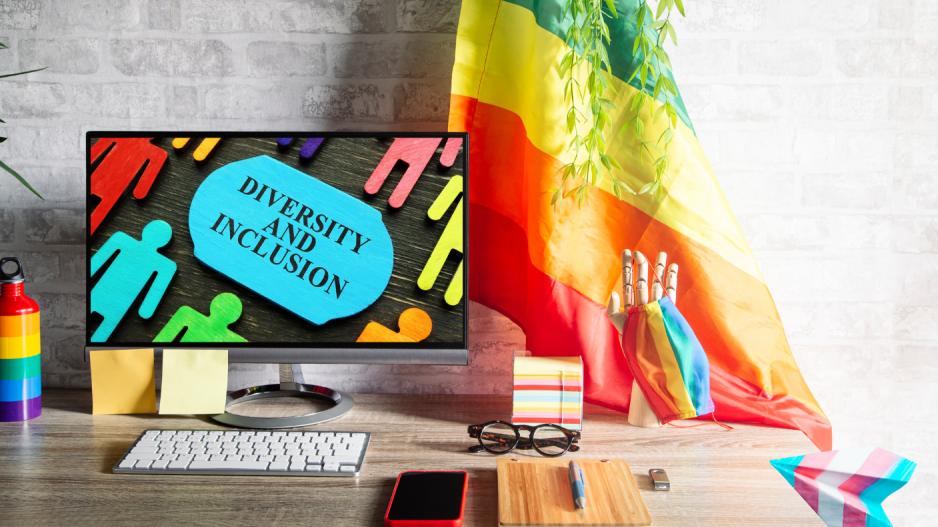Empowering Business Through Inclusivity - is Cyprus on the Right Track?
Does your business create an inclusive and supportive environment for lesbian, gay, bisexual, transgender, and queer (LGBTQ+) employees? Fostering inclusivity in today’s business landscape is a critical aspect of creating a thriving and progressive organization. One significant facet of inclusivity is ensuring the safety and engagement of the LGBTQ+ community across industries.
This community has faced discrimination and biases in the workplace, despite LGBTQ+ inclusion rising as a priority among organizations, highlighting the need for businesses to prioritize diversity and inclusivity.
There are some organizations and governments that are leading by example in promoting LGBTQ+ inclusivity by implementing policies that create a supportive and accepting work environment. These policies go beyond mere words, actively fostering an inclusive culture where LGBTQ+ employees feel valued and empowered.
While inclusive policies may encompass anti-discrimination measures and equal opportunity initiatives, they do not necessarily establish a sense of equity. Championing such policies is a solid start, but there must be further efforts made to ensure diversity and inclusion.
McKinsey’s research study on the experiences LGBTQ+ people face in the workplace sheds light on the challenges they face and some solutions and proactive actions business leaders should take. One key challenge is having to repeatedly “come out” at work. McKinsey’s research shows that just 32% of the junior employees included in the 2,000 survey participants feel comfortable to come out.
Others expressed that once coming out, it is a process they face weekly, and sometimes daily. According to their research, around 50% of their survey participants who have come out at work do so at least once a week.
These interactions bring about microaggressions from colleagues who are not aware of their own behavior or remarks, leading to LGTBQ+ people leaving their workplaces. This leads to them having to change the way they approach finding jobs, making the feeling of safety and security a top priority in their job search. According to a report from the BBC, “The Cap report showed that 35% of LGBTQ+ and 65% of transgender respondents surveyed have decided on where to work to avoid discrimination.”
Recently, there have been great efforts by both the private and public sectors to propagate and establish healthier and more inclusive work environments, as well as in Cyprus.
Leading up to June, which is known as Pride month, Cyprus passed a bill banning conversion therapies, making Cyprus the 36th member of European parliament to implement this bill into law. Conversion therapy includes various harmful and discredited methods on altering an individual’s sexual orientation, gender identity, or gender expression. Not only has the bill passed, but it also includes punitive measures for those who advertise conversion therapy, or attempt to force someone to undergo conversion therapy.
Telling someone that their brain has to be altered because of their sexual orientation places a heavy burden of isolation on them. It tells them that as they currently are, they do not belong, which is wrong.
By banning conversion therapies, the state of Cyprus further enables LGBTQ+ people to be included in the economy. Taking things a step further by implementing anti-discrimination policies encourages a business’ culture to be more inclusive, incentivizing LGBTQ+ people to join and contribute to the organization.
In fact, establishing LGBTQ+ friendly policies and culture pays off. According to Josie Cox, journalist and commentator on governance, economics, and the future of work, “academics at two universities in Finland assess the financial performance of 657 publicly-traded U.S. companies between 2003 and 2016, and found that firms with LGBT-friendly policies tend to enjoy both higher profitability and higher stock market valuations.
Many multinational corporations and industry-leading businesses are profound advocates of LGBTQ+ inclusion. The Human Rights Campaign, an initiative dedicated to helping build a more inclusive future strengthened through campaigns which push for bills and laws that support that vision, displays a list of 329 organizations that oppose anti-LGBTQ+ legislation. The list includes the likes of Google, Amazon, Apple, and Glassdoor, which should inspire businesses of all sizes to help marginalized individuals feel like they belong.
Accept board member, Alexander Davidian shared his insights on the empowering attributes of inclusivity and diversity in the workplace. "Employers everywhere, including in the context of Cyprus, need to realize that, when it comes to attracting and retaining the best talent, offering a big salary is no longer the trump card. Today, such organizations must also actively and authentically embrace inclusion and diversity in their work culture.
This is particularly important when you consider that the youngest generation, Gen Z, has grown up with diverse role models being visibly represented in the media and across disciplines, and they are unwilling to apply to or stay on at organizations who do not respect and support diversity. They are also unwilling to remain in work places where they cannot be their own authentic selves.
So, organizations that walk the talk when it comes to truly embracing inclusivity and diversity, with their minority group employees - be they disabled, LGBTQI, neurodiverse etc. - feeling safe to be visible and given the same opportunities for career advancement as their peers, will ultimately have the advantage in today's highly competitive market for talent."

Unfortunately, there are instances where companies have perpetuated discrimination and exclusion against LGBTQ+ individuals, as well as occasions where homophobic and anti-trans organizations pressured companies to minimize their LGBT+ support. Recently, Target, one of the largest general merchandise retailers in the US, has faced backlash after pulling Pride month products from its shelves due to an anti-trans campaign spreading ambiguous and false information on social media platforms regarding the products.
Target’s decision angered LGBTQ+ activists, as Kelley Robinson, president of the Human Rights Campaign stated “Target should put the products back on the shelves and ensure their Pride displays are visible on the floors, not pushed into the proverbial closet. That’s what the bullies want.”
Despite these intricacies, there are several ways to ensure the inclusion of LGBTQ+ people in the office.
Co-founder and CEO of URL Media, S. Mitra Kalita, spoke with LGBTQ+ and workplace experts in seeing what businesses can do to further ensure inclusive policies and practices, sharing their insights.
Among these experts, Andrew McCaskill, a career expert on LinkedIn’s communications team, stated that setting up the following three pillars are critical for employers: external support, company policies and training, and internal action.
External support refers to acts such as signing the letter from the Human Rights Campaign previously mentioned in this article, or ensuring that the language used in a company’s values statements clearly indicate LGBTQ+ friendly policies.
Company policies and training S. Mitra Kalita’s findings are about employers having “clear, enforceable policies in place to ensure workplaces are free of discrimination and microaggressions, while also offering education and bias training for managers and individual contributors.”
Emotional quotient (EQ), or emotional intelligence, may not come as naturally or instinctively for some at the office. By investing in training them to be more inclusive enables for a friendlier environment at the office, and one where marginalized people feel a sense of belonging.
The third pillar, internal action, entails spaces and systems within the company for LGBTQ+ people to convene and communicate together, sharing their achievements and concerns in a safe space.
Inclusivity in business is not a mere box to tick; it is an ongoing commitment to creating a workplace where every individual feels valued and respected. By actively embracing LGBTQ+ inclusion, businesses tap into the vast talent, creativity, and innovation that the community brings to the table.
Fostering inclusivity in today’s business landscape is a critical aspect for creating a thriving and progressive organization. The latest generation to enter the workplace - “Gen Z” - are making it clear that inclusivity and diversity in the workplace are non-negotiable.
By implementing inclusive policies, learning from past mistakes, and understanding the progress and challenges faced by the LGBTQ+ community, businesses can create an environment where every employee feels valued and respected. This not only benefits employees, but also enables businesses to operate at a higher level than their peers.






